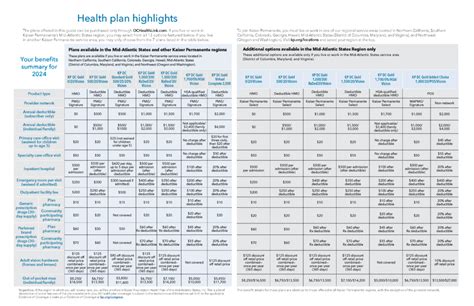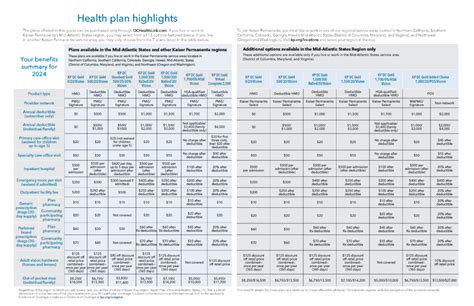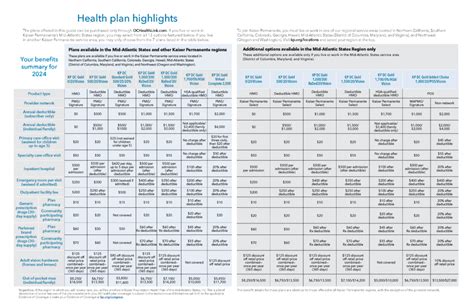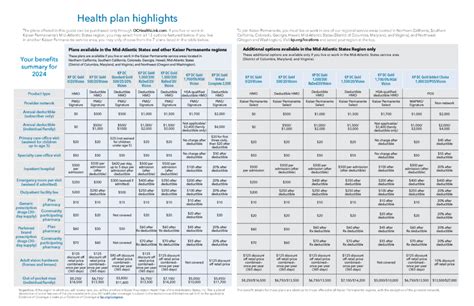Intro
Kaiser Permanente is a well-established healthcare organization that offers a wide range of insurance plans to individuals, families, and businesses. With a strong presence in eight states and the District of Columbia, Kaiser Permanente has become a trusted name in the healthcare industry. In this article, we will delve into the details of Kaiser Permanente insurance plans, exploring their benefits, features, and what sets them apart from other insurance providers.

Types of Kaiser Permanente Insurance Plans
Kaiser Permanente offers a variety of insurance plans to cater to different needs and budgets. Some of the most popular plans include:
- HMO (Health Maintenance Organization) Plans: These plans provide comprehensive coverage for medical, hospital, and pharmacy services. Members must receive care from Kaiser Permanente physicians and hospitals, with some exceptions for emergency care.
- HSA (Health Savings Account) Plans: These plans combine a high-deductible health plan with a savings account that allows members to set aside pre-tax dollars for medical expenses.
- POS (Point of Service) Plans: These plans offer more flexibility than HMO plans, allowing members to receive care from both Kaiser Permanente and non-Kaiser Permanente providers.
- PPO (Preferred Provider Organization) Plans: These plans provide a network of preferred providers, including Kaiser Permanente physicians and hospitals, as well as non-Kaiser Permanente providers.
Benefits of Kaiser Permanente Insurance Plans
Kaiser Permanente insurance plans offer numerous benefits, including:
- Comprehensive Coverage: Kaiser Permanente plans cover a wide range of medical services, including preventive care, hospital stays, and prescription medications.
- Affordable Premiums: Kaiser Permanente plans are often priced competitively, making them an attractive option for individuals and families on a budget.
- Large Network of Providers: Kaiser Permanente has a vast network of physicians, hospitals, and medical facilities, ensuring that members have access to quality care when they need it.
- State-of-the-Art Facilities: Kaiser Permanente's hospitals and medical facilities are equipped with the latest technology and staffed by experienced healthcare professionals.

How Kaiser Permanente Insurance Plans Work
Kaiser Permanente insurance plans operate on a unique model that integrates healthcare delivery and financing. Here's an overview of how the plans work:
- Membership: Members join Kaiser Permanente by enrolling in one of their insurance plans.
- Primary Care Physician: Members select a primary care physician from Kaiser Permanente's network of doctors.
- Referrals: Members can receive referrals to specialists within the Kaiser Permanente network.
- Care Coordination: Kaiser Permanente's care coordination team works with members to ensure seamless transitions between different levels of care.
Steps to Enroll in a Kaiser Permanente Insurance Plan
Enrolling in a Kaiser Permanente insurance plan is a straightforward process. Here are the steps to follow:
- Research Plans: Visit Kaiser Permanente's website or consult with a licensed insurance agent to explore plan options.
- Check Eligibility: Verify eligibility for Kaiser Permanente plans based on age, income, and residency.
- Choose a Plan: Select a plan that meets individual or family needs.
- Apply for Coverage: Submit an application for coverage, either online or by phone.
- Pay Premiums: Pay premiums on time to maintain coverage.

Kaiser Permanente Insurance Plans for Individuals and Families
Kaiser Permanente offers a range of insurance plans for individuals and families, including:
- Bronze Plans: Basic plans with lower premiums and higher deductibles.
- Silver Plans: Mid-level plans with moderate premiums and deductibles.
- Gold Plans: High-level plans with higher premiums and lower deductibles.
- Platinum Plans: Premium plans with the highest level of coverage and lowest out-of-pocket costs.
Kaiser Permanente Insurance Plans for Businesses
Kaiser Permanente also offers insurance plans for businesses, including:
- Group Plans: Customized plans for small and large businesses.
- Association Health Plans: Plans designed for small businesses and self-employed individuals.

Conclusion and Next Steps
In conclusion, Kaiser Permanente insurance plans offer a unique combination of comprehensive coverage, affordable premiums, and a large network of providers. Whether you're an individual, family, or business, Kaiser Permanente has a plan to suit your needs.
If you're interested in learning more about Kaiser Permanente insurance plans, we encourage you to:
- Visit Kaiser Permanente's website: Explore plan options and get a quote online.
- Consult with a licensed insurance agent: Get personalized advice and guidance on selecting the right plan.
- Contact Kaiser Permanente directly: Reach out to Kaiser Permanente's customer service team to ask questions and get more information.
By taking the next step, you can ensure that you and your loved ones have access to quality healthcare and financial protection.
What is the difference between an HMO and a PPO plan?
+An HMO plan requires members to receive care from Kaiser Permanente providers, while a PPO plan allows members to receive care from both Kaiser Permanente and non-Kaiser Permanente providers.
Can I see a specialist without a referral?
+Under most Kaiser Permanente plans, members need a referral from their primary care physician to see a specialist. However, some plans may allow self-referral to certain specialists.
How do I enroll in a Kaiser Permanente insurance plan?
+To enroll in a Kaiser Permanente insurance plan, visit their website or consult with a licensed insurance agent. You can also contact Kaiser Permanente directly to ask questions and get more information.
